|
|
|
Sort Order |
|
|
|
Items / Page
|
|
|
|
|
|
|
| Srl | Item |
| 1 |
ID:
128428
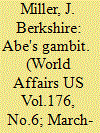

|
|
|
|
|
| Publication |
2014.
|
| Summary/Abstract |
China's aggressive actions in the East China Sea, combined with other factors, especially North Korea's continuing intransigence, have created an increasingly hostile security environment for Japan. Its response to these events can be seen in the impressive political rebirth of Shinzo Abe and the Liberal Democratic Party. While Abe, currently serving as prime minister for a second time, was elected largely because of his economic policies and the ineptitude of the formerly ruling Democratic Party of Japan, he has used his mandate to press forward with long needed, albeit controversial, defense and security reforms that indicate the seriousness with which Tokyo takes its current situation. With China looming up in front of them, and Pyongyang posing lesser but still worrisome threats, the Japanese have become acutely aware of the fact that their Self-Defense Forces (SDF) have one hundred and forty thousand ground troops, one hundred and forty-one maritime vessels, and four hundred and ten aircraft, while China's People's Liberation Army has one million six hundred thousand troops and North Korea has one million soldiers. Meanwhile, North Korea maintains a significant, if decaying, navy and air force, with one hundred and ninety vessels and approximately six hundred aircraft. China's much more capable maritime and air assets include nine hundred and seventy vessels and two thousand five hundred and eighty aircraft.
|
|
|
|
|
|
|
|
|
|
|
|
|
|
|
|
| 2 |
ID:
128430
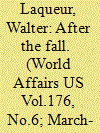

|
|
|
|
|
| Publication |
2014.
|
| Summary/Abstract |
As the Soviet Union disintegrated, ending on the ash heap of history in 1989-91, all the institutes for the study of Marxism-Leninism that had justified the regime, the collected and selected works of the communist classics, and the Marxism chairs in academies and universities also disappeared. From this void emerged a burning question: What was the raison d'être of the existing political system? And later, how did the new regime justify itself in the field of foreign and domestic affairs, and what was its social and economic policy? For the answers, Vladimir Putin and his followers went back to the future. Russia's official ideology prior to 1917 was Pravoslavie, Samoderzhavie,Narodnost, which has been translated as Orthodoxy, Autocracy, Nationality. This statement was made first by Sergei Uvarov, the Russian minister of education, in a circular letter in 1833. Uvarov was a learned man who also served as president of the Russian Academy of Sciences. No one had asked Uvarov to prepare such an official binding declaration. However, Czar Nicholas I liked this "triad," as it was called, even though its meaning was by no means always clear.
|
|
|
|
|
|
|
|
|
|
|
|
|
|
|
|
| 3 |
ID:
128418
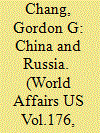

|
|
|
|
|
| Publication |
2014.
|
| Summary/Abstract |
Economic weakness has driven Vladimir Putin's Russia into a "strategic entente" with the Chinese, who in turn get a powerful global ally. The alliance could prove formidable for the West.
|
|
|
|
|
|
|
|
|
|
|
|
|
|
|
|
| 4 |
ID:
128424
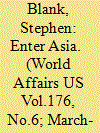

|
|
|
|
|
| Publication |
2014.
|
| Summary/Abstract |
The Arctic, always before on the frigid edges of the international imagination, is becoming a hot topic in world affairs, particularly in Asia, because of its virtually untapped resources and increasing strategic importance. In 2012, the amount of cargo transported through the region more than doubled, and in May 2013 the Arctic Council, traditionally membered by Europe's Nordic countries, along with Russia, Canada, and the US, granted observer status to China, Japan, India, South Korea, Singapore, and Italy, a reminder that climate change is opening the Arctic to wider use and commercial exploitation, especially by Asian interests. Indeed, a Chinese shipping company sent that country's first commercial voyage through the Arctic in September 2013. And Russia is negotiating with Korean shippers about using the Northern Sea Route (NSR) for energy shipments. These developments are already bringing the Arctic and Asian security agendas together, and in the process changing Asia's strategic boundaries and planning.
|
|
|
|
|
|
|
|
|
|
|
|
|
|
|
|
| 5 |
ID:
128414


|
|
|
|
|
| Publication |
2014.
|
| Summary/Abstract |
January 22nd, the date usually celebrated in Ukraine as the Day of Unity between east and west, will now go down in history as the day the two-months-long Euromaidan movement saw its first fatalities as violence escalated in Kyiv's city center, with internal troops and special forces pitted against the formerly peaceful protesters in a vicious, at times almost medieval battle. One civic activist was found beaten to death in the woods outside Kyiv, and others were shot as they took part in the standoff.
|
|
|
|
|
|
|
|
|
|
|
|
|
|
|
|
| 6 |
ID:
128429
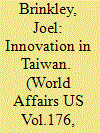

|
|
|
|
|
| Publication |
2014.
|
| Summary/Abstract |
Taiwan's president, Ma Ying-jeou, sat in a low leather chair looking out over the vast presidential conference room of his Taipei office. On the wall behind him hung a portrait of Sun Yat-sen, the Chinese icon who is credited with the revolution a century ago that ended two thousand years of imperial rule. Under Ma's feet lay a light blue carpet festooned with white representations of ocean waves. Overhead, white cloth, styled like ship sails, covered the ceiling lights-all of it intended to represent Taiwan's journey away from mainland China. Asian conference rooms are unlike those in the West. There's no mahogany conference table. Instead, plush chairs are arranged in a U shape. And the conference leader, in this case President Ma, sits at the center with his conferees to his left and right-university professors, think tank leaders, and government officials from Asia and the West who were there for a conference on the East China Sea debate between Taiwan, China, and Japan.
|
|
|
|
|
|
|
|
|
|
|
|
|
|
|
|
| 7 |
ID:
128426


|
|
|
|
|
| Publication |
2014.
|
| Summary/Abstract |
We were sitting in a cafe on the Left Bank in Paris in November 1978 when the news broke that two thousand five hundred and sixty-four Vietnamese were stranded off the coast of Malaysia on a rusty cargo ship, the Hai Hong. They had fled Vietnam in a desperate attempt to seek freedom and asylum overseas. After sixteen days on the South China seas, buffeted by storms, crushed by the heat, with no more food or water, they had arrived on the shores of Indonesia, then Malaysia, only to be pushed back by the coast guards. They had nowhere to land, and the ship could go no further. Stranded and helpless, starving and totally dehydrated, they were dying before our eyes as they unfurled a makeshift banner in English across the side of the ship: "UN please save us."
|
|
|
|
|
|
|
|
|
|
|
|
|
|
|
|
| 8 |
ID:
128425
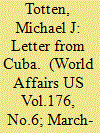

|
|
|
|
|
| Publication |
2014.
|
| Summary/Abstract |
A side from the Arab boycott against Israel, American sanctions against Cuba have lasted longer than any other embargo in the modern era. Is the US embargo against Cuba a Cold War relic or an effective tool? A recent visit suggests that the Castro regime's tyrannical imbecility still justifies continued sanctions. The sanctions were imposed in stages in the early 1960s after Fidel Castro began economic warfare against the United States by nationalizing private US property on the island. Cuban communism survived the collapse of the Soviet Union and the end of the Cold War, so in 1993 the purpose of the embargo was modified by the Cuban Democracy Act, stating that it will not be lifted unless and until the government in Havana respects the "internationally accepted standards of human rights" and "democratic values."
|
|
|
|
|
|
|
|
|
|
|
|
|
|
|
|
| 9 |
ID:
128433
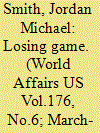

|
|
|
|
|
| Publication |
2014.
|
| Summary/Abstract |
The sentiments of Truman's State Department toward the Middle East are well documented. Hugh Wilford's engaging new book convincingly explores similar sentiments in the early CIA. One of the most famous anecdotes of the Truman administration was first revealed by presidential adviser Clark Clifford in his memoirs. Secretary of State George Marshall and his undersecretary were called into the Oval Office to debate with Clifford the merits of recognizing Israel. After Clifford argued in favor of Israel, Marshall, whom Winston Churchill called the "Organizer of Victory" for his role as army secretary during World War II, made what Clifford called "the most remarkable threat I have ever heard anyone make directly to a president." Said Marshall to Truman: "If you follow Clifford's advice and if I were to vote in the election, I would vote against you. Marshall's stunning comment reflected the viewpoint of "almost every member of the brilliant and now legendary group of presidential advisers, later referred to as the Wise Men, who were then in the process of creating a postwar foreign policy that would endure for more than forty years," recalled Clifford. Those advisers included such luminaries as George Kennan, Dean Acheson, Dean Rusk, and Charles Bohlen. They were later dubbed the "Arabists" because they believed that the Arabs could be allied with America after World War II-and should be courted instead of Israel.
|
|
|
|
|
|
|
|
|
|
|
|
|
|
|
|
| 10 |
ID:
128427
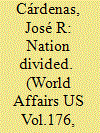

|
|
|
|
|
| Publication |
2014.
|
| Summary/Abstract |
A year after the death of Hugo Chávez from cancer, Venezuela remains as polarized as at any time during the flamboyant strongman's fourteen-year rule. As the dysfunctional economy he bequeathed to his successors continues to unravel-despite proven oil reserves rivaling those of Saudi Arabia-a determined political opposition continues its uphill fight against what Chávez designed as a permanent revolution. President Nicolás Maduro, Chávez's anointed successor, came to power in a special election last April that was much closer than expected, sending shock waves through the chavista ranks. There were enough doubts about the legitimacy of the vote that his opponent, Henrique Capriles, never conceded. Since then, Maduro has struggled to escape Chávez's shadow and assert his authority over the faction-ridden chavista party, the PSUV, a hodgepodge of leftists of all stripes along with a faction of the military loyal to the late president. Maduro has been buffeted by one challenge after another: infrastructure breakdowns leading to electricity shortages, scarcity of basic consumer items, rampant inflation, declining production, an overvalued currency (the black-market rate for dollars is ten times higher than the official exchange), and rampant street crime.
|
|
|
|
|
|
|
|
|
|
|
|
|
|
|
|
| 11 |
ID:
128432
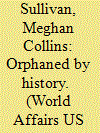

|
|
|
|
|
| Publication |
2014.
|
| Summary/Abstract |
In July 2011, Laurentiu Ierusalim left his Romanian orphanage, the only home he had ever known. He had less than $150 in his pocket and nothing more than the clothes he was wearing. He had no job, no housing, and no clue how to survive. "I didn't know what to do," Ierusalim says, "so I slept in a playground across the street." It was the beginning of two years of homelessness, of knocking on doors to ask for food and shelter. An Orthodox priest helped him find families to take him in for several weeks at a time. Last summer, after finally surmounting the formidable bureaucratic and financial obstacles required to secure a government ID, he landed his first job as a grocery store clerk. With slight variations, Ierusalim's story is told over and over again in the experiences of the tens of thousands of children shunted away in Romanian orphanages during the reign of communist dictator Nicolae Ceausescu. The execution of Ceausescu and his wife on Christmas Day 1989 led to the discovery of the country's most disturbing secret-enough abandoned children to make up a city had been living in squalor for years, packed into unsanitary orphanages without appropriate resources, care, or stimulation.
|
|
|
|
|
|
|
|
|
|
|
|
|
|
|
|
|
|
|
|
|